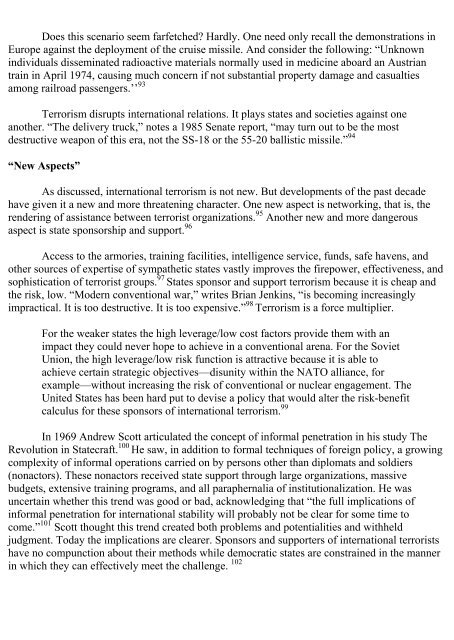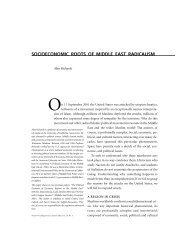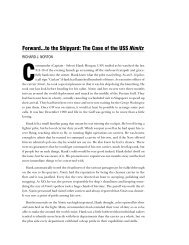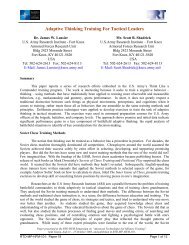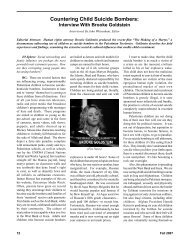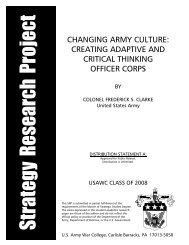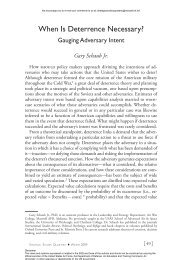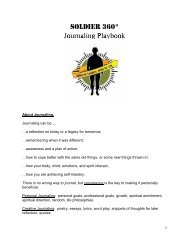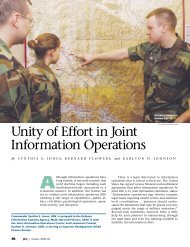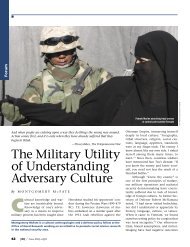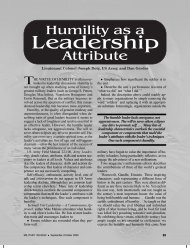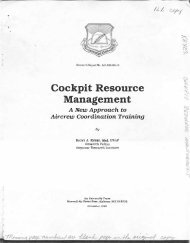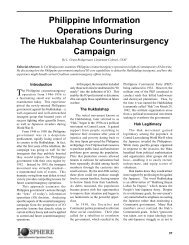Legitimate use of military force against state-sponsored - Air University
Legitimate use of military force against state-sponsored - Air University
Legitimate use of military force against state-sponsored - Air University
Create successful ePaper yourself
Turn your PDF publications into a flip-book with our unique Google optimized e-Paper software.
Does this scenario seem farfetched? Hardly. One need only recall the demonstrations in<br />
Europe <strong>against</strong> the deployment <strong>of</strong> the cruise missile. And consider the following: “Unknown<br />
individuals disseminated radioactive materials normally <strong>use</strong>d in medicine aboard an Austrian<br />
train in April 1974, causing much concern if not substantial property damage and casualties<br />
among railroad passengers.’’ 93<br />
Terrorism disrupts international relations. It plays <strong>state</strong>s and societies <strong>against</strong> one<br />
another. “The delivery truck,” notes a 1985 Senate report, “may turn out to be the most<br />
destructive weapon <strong>of</strong> this era, not the SS-18 or the 55-20 ballistic missile.” 94<br />
“New Aspects”<br />
As discussed, international terrorism is not new. But developments <strong>of</strong> the past decade<br />
have given it a new and more threatening character. One new aspect is networking, that is, the<br />
rendering <strong>of</strong> assistance between terrorist organizations. 95 Another new and more dangerous<br />
aspect is <strong>state</strong> sponsorship and support. 96<br />
Access to the armories, training facilities, intelligence service, funds, safe havens, and<br />
other sources <strong>of</strong> expertise <strong>of</strong> sympathetic <strong>state</strong>s vastly improves the firepower, effectiveness, and<br />
sophistication <strong>of</strong> terrorist groups. 97 States sponsor and support terrorism beca<strong>use</strong> it is cheap and<br />
the risk, low. “Modern conventional war,” writes Brian Jenkins, “is becoming increasingly<br />
impractical. It is too destructive. It is too expensive.” 98 Terrorism is a <strong>force</strong> multiplier.<br />
For the weaker <strong>state</strong>s the high leverage/low cost factors provide them with an<br />
impact they could never hope to achieve in a conventional arena. For the Soviet<br />
Union, the high leverage/low risk function is attractive beca<strong>use</strong> it is able to<br />
achieve certain strategic objectives—disunity within the NATO alliance, for<br />
example—without increasing the risk <strong>of</strong> conventional or nuclear engagement. The<br />
United States has been hard put to devise a policy that would alter the risk-benefit<br />
calculus for these sponsors <strong>of</strong> international terrorism. 99<br />
In 1969 Andrew Scott articulated the concept <strong>of</strong> informal penetration in his study The<br />
Revolution in Statecraft. 100 He saw, in addition to formal techniques <strong>of</strong> foreign policy, a growing<br />
complexity <strong>of</strong> informal operations carried on by persons other than diplomats and soldiers<br />
(nonactors). These nonactors received <strong>state</strong> support through large organizations, massive<br />
budgets, extensive training programs, and all paraphernalia <strong>of</strong> institutionalization. He was<br />
uncertain whether this trend was good or bad, acknowledging that “the full implications <strong>of</strong><br />
informal penetration for international stability will probably not be clear for some time to<br />
come.” 101 Scott thought this trend created both problems and potentialities and withheld<br />
judgment. Today the implications are clearer. Sponsors and supporters <strong>of</strong> international terrorists<br />
have no compunction about their methods while democratic <strong>state</strong>s are constrained in the manner<br />
in which they can effectively meet the challenge. 102


